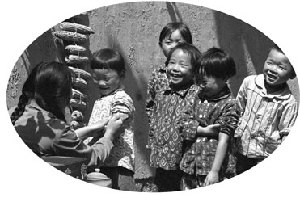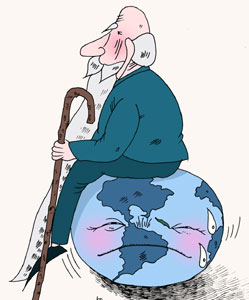Special report: The value of children in China
Updated:2011-10-30 15:25
By Quan Li (chinadaily.com.cn)
|
 |
|
?Editor's note: Thirty-one years ago, China introduced its family planning policy, conventionally misrepresented in the Western media as ‘one-child policy,’ in a bid to curb the population's pressure on the environment and resources, as well as to raise the people’s quality of life. It officially restricts urban couples? of China's dominant Han people, not minority ethnic groups, to having only one child, while allowing exemptions in certain cases.
Under the compulsory policy, 400 million people have been prevented from being added to the China’s population within three decades. But problems such as an aging population and skewed sex ratio have also emerged with this policy.? As the global population will hit 7 billion at the end of this October, we take a brief look at the population-related events that make headlines in China. Editor: Quan Li |
| ? | ?
?Gone, the slogans? In recent years,?as the government advocates a people-first philosophy in governance, those slogans disappear quickly and some can only be found on photos. “No one can ever escape punishment on having illegal children." "The more children you have, the more money you lose." "Abortion is encouraged, children are never welcomed.” |
|
?Coming, the challenges |
|
♂Sex imbalance The traditional preference for sons over daughters has led to the abuse of sex-selective abortion, especially in rural areas.
It is estimated that 10 years later, about 24 million men will not be able to find women to get married. And male laborers will move into the industries that are traditionally dominated by the female due to oversupply of male labors. Authorities have begun a national campaign to crack down on illegal fetal sex testing and sex-selective abortions in August. The government is also trying to change people's minds of sex prejudice and implementing policies encouraging gender equity. |
By the end of 2011, China will have a total of 177 million people above the age of 60, over 13 percent of the total population. This is an increase of almost 3 percentage points compared with a decade ago, and the figure is expected to rise to 216 million by 2015, accounting for 16 percent of the total population.? |
|
?Adjustment Family planning policies have loosened over the years. In many parts of the country, couples made up of people from one-child families are permitted to have two children. In rural areas, couples are permitted to have a second child if their first child is female. In Zhouqu, a county in northwestern Gansu province, the restriction is relaxed for families who lost children in a massive mudslide a year ago. Operations to untie women's tubes that were tied as a result of past enforcement of the family planning policy are now free. In Guangdong, a province in southern China, the government had applied to the central government for approval of allowing a second child for couples with either the husband or wife is an only child. Although the plan was dropped afterwards, the practice shows the initial attempt of relaxing the compulsory policy in the country. "We'll fine-tune the family planning policy gradually,” said Li Bin, minister of the National Population and Family Planning Commission. |
From arranged marriages to blind dates, building a family in China is an evolving process driven by political change, economic development, and social trends, all intrinsically linked under the umbrella of globalization. |



